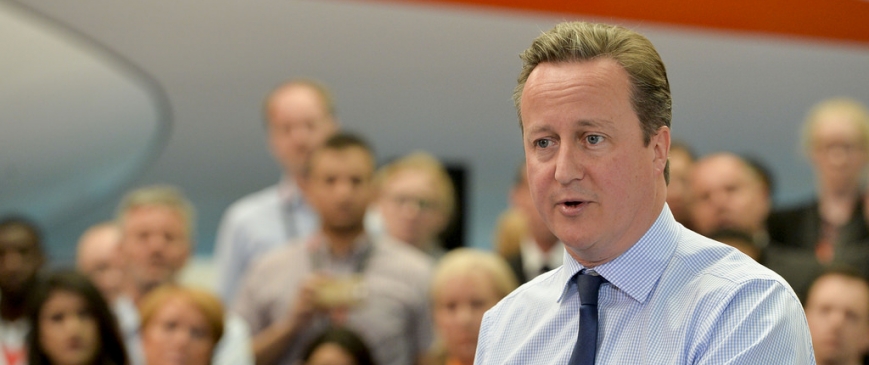
Ten things Cameron should do if we vote "Remain"
If the UK votes on 23rd June to stay in the EU, Britain and its partners will face a choice: to carry on with their previous dysfunctional relationship, or to create something better.
For British Prime Minister David Cameron, the easy option will be returning to how things were. Anything short of an (improbable) crushing vote in favour of remaining will not quiet his eurosceptic party colleagues. Any hint of a more positive approach to Europe and they will accuse him of promising the voters one kind of relationship with the EU but giving them another.
Cameron has little to lose, however, from making a fresh start. He has already said that he will not contest the next general election in 2020. He can bequeath to his successor the role of Europe’s curmudgeon, irritating other member-states without placating his domestic enemies. Or he can show Europe that he has learned the value of teamwork, and show Britons that the UK gains by working with the EU instead of against it.
Some member-states may doubt that Britain can ever be a fully committed member of the Union. Cameron needs to show that there will be no more ultimatums: “Give us what we want or we leave.” Instead, here are ten suggestions for persuading partners that the UK is now fully engaged.
Security and counter-terrorism. In the campaign, Cameron has stressed the EU’s contribution to Britain’s security. Other member-states may have been irritated by Britain withdrawing from justice and home affairs measures in 2013, only to opt back into the most important; but the UK remains a crucial partner in fighting crime and terrorism. It should step up operational collaboration and use its intelligence expertise to help create a regulatory framework that balances privacy and security.
Migration. Though outside the Schengen borderless area, Britain cannot escape the impact of the refugee crisis. The UK has argued that giving asylum seekers legal channels to come to Europe would ruin the people smugglers’ business model; it should set an example by resettling more refugees in Britain.
Defence. The EU does not need its own army, but Europeans need to work together better in defence. Britain should support more EU intelligence sharing (for example, targeting people smugglers in Libya), pooling of logistic capabilities including air-to-air refuelling tankers, and joint defence research.
The single market. Britain has a special incentive to push for the single market to cover more of the services sector, in which the UK is strong. The UK should acknowledge that more single market means more regulation at the EU level, and support growth-promoting reforms.
Energy. The UK has pushed a market-based approach to reforming the EU energy sector, but it should accept that the market alone will not protect Central European countries reliant on Russian gas, and work with the Commission to ensure that countries have both an obligation and the infrastructure to supply their neighbours in a crisis.
Neighbourhood. The EU’s neighbourhood, to the east and south, is a mess. Enlargement, which stabilised Central Europe after 1989, is increasingly unpopular in the EU, and not on offer to countries in the Middle East and Maghreb. Britain should work with other leading member-states to devise a comprehensive plan of security operations, political engagement and free trade to stabilise the neighbourhood.
Foreign policy. As one of the few EU countries with a global outlook, Britain should resume its traditional leading position in EU foreign policy. London should work with the European External Action Service and countries like France to ensure an EU response wherever international tensions threaten European interests, including in East Asia.
Trade. The UK should co-ordinate with northern and central European free-traders and leverage its good relations with countries like China, Japan and Australia to promote faster progress in EU free trade negotiations with major economies.
European Parliament. Cameron should show that he understands the positive and complementary roles the European Parliament and national parliaments can play, working together, in increasing the democratic legitimacy and political accountability of the EU.
Rebuilding Britain’s EU expertise. The UK is now very under-represented in EU institutions. The government should encourage the best young civil servants to work in the Commission and the External Action Service, and challenge the prejudice that British ‘eurocrats’ have betrayed the UK for salaries and perks. And it should simultaneously increase its bilateral diplomatic effort in Europe to rebuild the UK’s influence in capitals.
The UK renegotiation and referendum have been a distraction from the real problems facing the EU: the eurozone crisis, the refugee crisis and Russia’s invasion of Ukraine. The UK has often looked more like an attention-seeking child than a partner in finding solutions. Once Britain’s EU membership is secure, it needs to show that it is an ambitious and forward-looking European power - for Europe’s sake, and its own.
Ian Bond is director of foreign policy at the Centre for European Reform.
